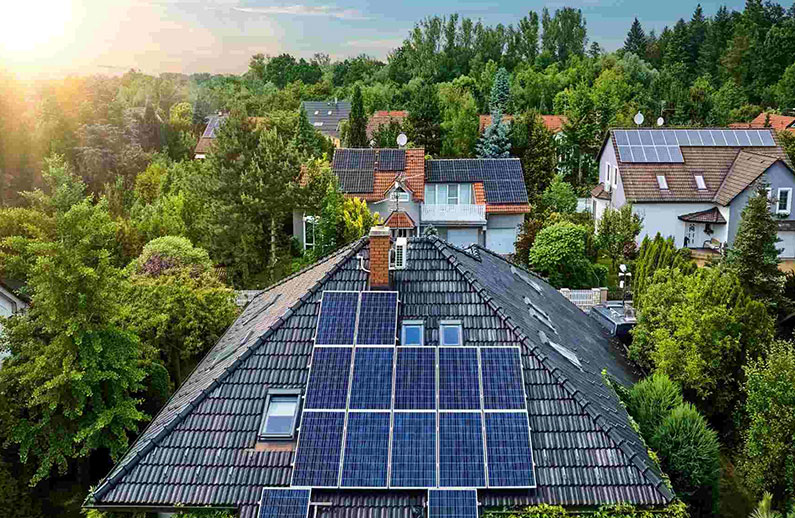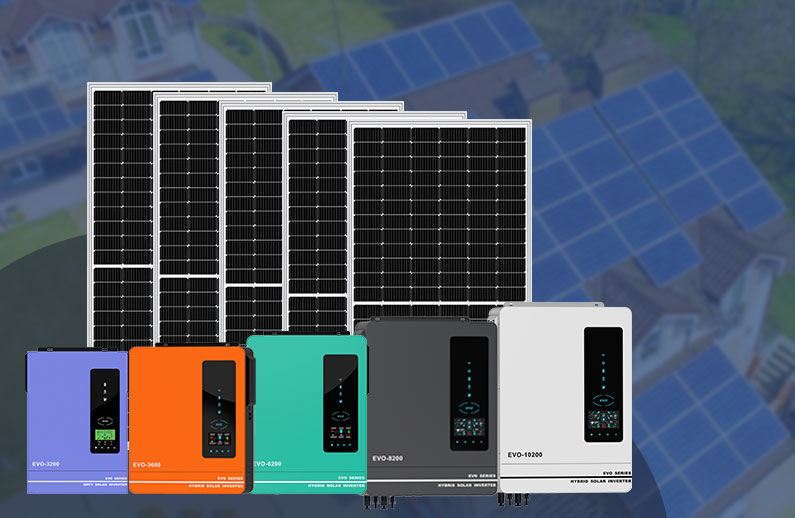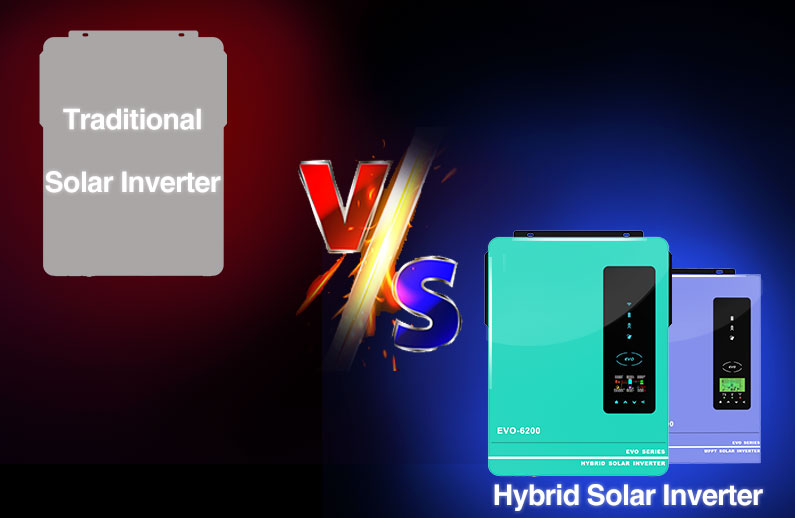What is a hybrid solar inverter and how does it work?
Jul 18, 2025
A hybrid solar inverter helps you use solar power better. It controls how energy moves between your solar panels, batteries, and the power grid. You can save extra solar energy in batteries. This energy can be used at night or when the power goes out. A hybrid inverter is different from a regular solar inverter. It works with both the solar system and batteries. This gives you more control over your energy use. Many homes and businesses use a hybrid solar inverter. It gives steady power and helps lower energy bills.
Here are some common uses for a hybrid solar inverter:
Setting
Common Applications
Residential
Changes solar energy for home use, saves extra energy, helps during power outages.
Commercial
Lowers costs, keeps power steady, manages energy with big solar setups and batteries.
Off-Grid/Weak Grid
Saves extra solar power, keeps lights on when the network is down or at night.
Hybrid Solar Inverter Basics
Main Functions
A hybrid solar inverter does more than just change power. It has many important jobs in one device. Here are the main things it does:
DC-AC Conversion: The inverter takes DC from your solar panels and turns it into AC. Your home or business uses AC for most things.
Battery Charging and Discharging: The hybrid inverter controls your battery storage. It can help batteries store extra solar energy. It uses battery power when you need backup.
Load Management: The inverter picks where your energy comes from. It chooses solar panels, batteries, or the grid based on what you need.
A hybrid solar inverter mixes the features of a solar inverter and a battery inverter. You get backup power, energy storage, and smart energy control in one system.
Here is a table that shows how a hybrid inverter is different from a standard solar inverter:
Feature/Function
Standard Solar Inverter
Hybrid Solar Inverter
Power Conversion
Changes DC from solar panels to AC for use or grid
Changes DC to AC and controls battery charging and use
Power Flow Direction
One-way (solar panels to grid or house)
Two-way (solar, battery, and grid)
Energy Storage
None
Has battery storage with built-in battery control
Backup Power
No backup power during outages
Gives backup power during outages using battery energy
Grid Dependency
Needs the grid; stops working during outages
Can work without the grid during outages
Energy Management
Basic (solar to load or grid)
Advanced (controls solar, battery, and grid; moves loads)
Cost
Lower cost because it is simple
Higher cost because of battery and more features
How It Works
You can think of a hybrid solar inverter as the brain of your solar system. It controls how energy moves between your solar panels, batteries, and the grid. Here is how it works step by step:
Your solar panels collect sunlight and make DC electricity.
The inverter changes this DC into AC for your home or business.
If you make more solar energy than you use, the inverter sends extra power to your batteries.
When your batteries are full, the inverter can send extra energy to the grid. Some places give you credits for this.
If your solar panels do not make enough energy, the inverter can use power from your batteries.
If your batteries are low, the inverter can get power from the grid to keep your lights on.
During a power outage, the hybrid inverter uses battery power. You still have electricity even if the grid is down.
A hybrid inverter uses smart tech to balance all these jobs. It keeps your energy moving well and helps you use more solar power.
Energy Flow Management
A hybrid solar inverter controls energy flow in a smart way. You do not need to switch between solar, battery, or grid power. The inverter does this for you. Here is how it manages energy:
It always uses solar energy first to power your home or business.
If you have extra solar energy, it charges your batteries.
When your batteries are full, it sends extra energy to the grid.
If you need more power than your solar panels make, it uses battery energy.
If both solar and battery power are low, it gets energy from the grid.
During a blackout, it switches to battery power so you do not lose electricity.
Many hybrid inverters have tools to check your energy use and battery levels. You can see this on your phone or computer. This helps you know how your solar system works every day.
Hybrid inverters often reach DC-AC conversion rates between 93% and 96%. Some top models can reach up to 99% efficiency in the best conditions. This means you get more usable energy from your solar panel system and battery storage.
Hybrid Inverter vs. Solar Inverter
Key Differences
You might ask how a hybrid inverter is different from a solar inverter. The biggest difference is energy storage and control. A solar inverter changes DC power from your solar panels into AC power for your house or business. It sends any extra energy right to the grid. You cannot keep this extra energy for later use. If the grid goes out, your solar inverter stops working to keep things safe.
You can use it at night or when the power is out. The hybrid inverter controls charging and using the batteries. It also picks how much energy comes from solar, batteries, or the grid. This makes your energy system smarter and easier to use.
A hybrid inverter lets you control your solar energy better. A solar inverter is simpler and costs less.
Advantages of Hybrid Inverters
When you pick a hybrid inverter, you get many good things for your solar system:
Better Energy Efficiency: The hybrid inverter uses smart controls. It helps you use more solar energy. You use the grid less and save money.
Reliable Power Supply: You get backup power from batteries during blackouts. Your lights and important things stay on, even if the grid fails.
Cost Savings: You can store extra solar energy. You use it when electricity costs more. Some people see big drops in their bills.
Smart Energy Management: The hybrid inverter chooses when to use solar, battery, or grid power. You do not need to switch anything yourself.
Flexibility and Growth: You can add more batteries or solar panels later. The system can grow as you need.
Hybrid inverter benefits are energy freedom, lower bills, and steady power.
Limitations
Even though a hybrid inverter has many good points, there are some things to think about:
Hybrid inverters usually cost more than solar inverters. The extra features and battery storage make the price higher.
The system is more complicated. You may need a pro to set it up and take care of it.
Hybrid inverters need careful planning. You must match your solar panels and batteries. This helps the system work well and last longer.
If you want the best mix of solar power, battery storage, and grid help, a hybrid inverter is a smart pick. It gives you more control and helps you worry less.
Solar Hybrid Inverter Types
Dual AC Output Models
Dual AC output models let you power two areas at once. These inverters give two AC outputs with the same voltage and phase. This helps you use your solar power better. You can manage loads more easily. Many models work on-grid, off-grid, or in hybrid mode. Some even work without batteries. These inverters have smart load management and remote monitoring. You can check your system on a display or your phone.
Specification Aspect
Details
Power Ratings
4.3kW, 6.3kW, 8.3kW, 10.3kW, 12.3kW
AC Output Voltage
220V/230V/240V
Max PV Input Voltage
500V DC
Working Modes
On-grid, off-grid, hybrid, batteryless
Features
Dual AC outputs, intelligent load management, remote monitoring, battery compatibility
Typical Use Cases
Homes, commercial buildings, off-grid systems
Tip: Dual AC output inverters let you split power for different needs. This makes your solar system more flexible.
4.2KW, 6.2KW, and 10.2KW Options
You can pick from different power levels for your needs. The 4.2KW and 6.2KW models fit small or medium homes. They run daily appliances and give backup power. The 10.2KW Hybrid Solar Inverter is for bigger homes or small businesses. Each inverter can handle high starting loads. These models work with 24V or 48V batteries. You get steady AC power for your lights and equipment.
Model
Rated Power (W)
Max PV Input Power (W)
Surge Power (W)
Battery Voltage (V)
Suitable Installation Size
4.2KW
4200
6200
8400
24
Small homes, off-grid cabins
6.2KW
6200
6500
12400
48
Medium homes, small businesses
10.2KW
10200
12000
20400
48
Large homes, commercial buildings
Applications
Solar hybrid inverters work in many places. In homes, they keep lights and appliances on during outages. In businesses, they power computers, lights, and machines. Off-grid cabins and remote sites also use these inverters. You get steady power day and night. The system stores extra solar energy in batteries for later. Many inverters let you track performance with an app. You can see how much solar energy you use and save.
AC-coupled inverters are good for adding batteries to old solar setups.
DC-coupled inverters are more efficient for new solar systems.
Pick your inverter based on your energy needs and future plans.
Note: A solar hybrid inverter gives flexible power for homes, businesses, and off-grid places. You get reliable electricity and better control over your energy use.
Pros and Cons
Benefits
If you pick a hybrid inverter, you get many good things:
You make your own power, so you pay less for electricity.
Some places give you tax breaks or rewards to help with costs.
Hybrid inverters last longer than old systems, so you fix them less.
These inverters use both solar and grid power, making them work better.
Special features like MPPT help your solar panels do their best.
You can keep extra solar energy in batteries for night or blackouts.
Using a hybrid inverter means you use less fossil fuel, which helps nature.
Smart tools let you watch and control your energy, so it is easy to use.
Your home might be worth more because you have a modern energy system.
Tip: Hybrid inverters help you save money, control your power, and use cleaner energy at home or work.
Drawbacks
There are some things that are not so good about hybrid inverters:
They will cost a little more than regular inverters because of extra features and batteries.
You need a pro to set up the system because it is more complicated.
You may need to learn how your system works to use it well.
It can cost more to keep up because there are more parts and tech.
Note: Good planning and help from experts make your hybrid inverter last longer and work better.
Maintenance
It is important to take care of your hybrid inverter. You should check your system once a year. Here are some easy things to do:
Clean off dust or dirt from the inverter and solar panels.
Look at all wires and make sure they are tight and safe.
Check that cooling fans or heat sinks are working right.
Update the software if your inverter has smart features.
Watch for warning lights or error messages.
Test the energy output to see if your system is working well.
Doing regular checks stops problems like overheating or bad wires. Basic service visits usually cost $150 to $300. If you need more work, like updates or repairs, it might cost more. Taking care of your hybrid inverter keeps your solar system working well and saves you money.
Investment and Suitability
Cost Factors
When you think about the price of a hybrid inverter system, you need to look at more than just the inverter. The total price also includes solar panels, batteries, and installation. Sometimes, you need to upgrade your electrical system too. If you put in solar panels and batteries at the same time, you save money. You only need one set of permits and inspections. The size of your battery, the kind of inverter, and if the parts work together all change the price. The price depends on what you need.
Tip: You can use government programs like the 30% Federal Investment Tax Credit to help pay for your solar and battery system.
Who Should Choose a Hybrid Inverter
A hybrid inverter is a good choice for many people. It is helpful if you want solar panels now and batteries later. This system lets you pick different battery brands. If you live where the power goes out a lot, a hybrid inverter keeps your lights on. You can also save money by using extra solar energy at night or when it is cloudy.
Homeowners in sunny places can use more solar power.
People who want lower electric bills can store and use their own energy.
If you care about nature, using more solar energy helps the planet.
Future-Proofing
A hybrid inverter helps you get ready for changes. You can switch between grid and off-grid modes when the power goes out. The system lets you save solar energy and use it when electricity costs more. Many hybrid inverters let you change how they work as rules or prices change. Remote updates keep your inverter working with new rules. You can add more panels or batteries if you need more energy later.
Note: Picking a hybrid inverter means you can keep up with new technology and changing energy needs over time.
A hybrid solar inverter lets you use solar power in smart ways. You get backup power when the grid goes out. It helps you manage your energy easily. Your bills can be lower too. Here are the main ideas:
The inverter changes solar power for your house. It saves extra energy in batteries for later.
It controls power from solar panels, batteries, and the grid.
You get steady electricity, even if there is a blackout.
You can check your system with apps. You can add more batteries if you need them.
Think about how much energy you use. Talk to a certified installer for help. Hybrid inverters make solar systems work better for everyone.




 Network Supported
Network Supported